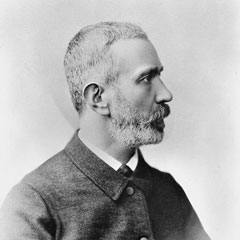






The company Bleyle was founded in 1889 by Wilhelm Bleyle (1850-1915) from Feldkirch (Austria). After training as a retail merchant in cigar trade in Ulm and professional experience as an accountant and a sales representative for a Stuttgart-based company, Wilhelm Bleyle first had the general store of a brother in Feldkirch continue when he emigrated to the United States. 1885 Bleyle bought a knitting machine, at first only for private use to dress his six children inexpensive. This gives a business idea, which he implemented in Stuttgart in 1889 developed. He opened a "yarn shop with production and sale of knitted goods".
At this time William Bleyle had five knitting machines, about 5000 Goldmark equity and eight employees. Unlike other knitwear manufacturers this time was William Bleyle not complete garments at a stretch knit, but great tracks, from which he had to cut the individual parts and then sew. This method proved to be in the following years to be very successful.
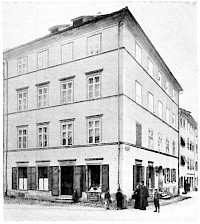
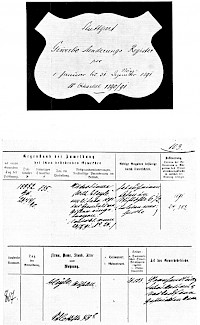
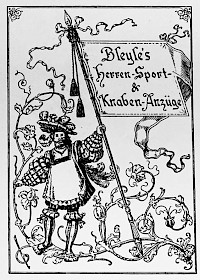
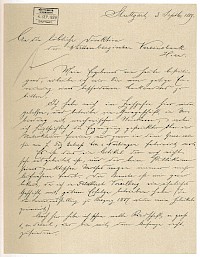
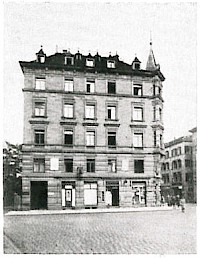
The knitted sailor suits belonged to the first products which the company Bleyle produced, for boys which were very popular at this time. The production soon expanded and in 1901 the company covered the first own factory building. In 1903 a branch company followed in Brackenheim, in 1905 in Ludwigsburg. In 1912 new company headquarters were covered in Rotebühlstrasse (corner Röte- and Seyffertstrasse) in Stuttgart. A year later in 1913 Wilhelm Bleyle handed over the management to his sons Max and Fritz and to his brother-in-law Arthur Weber, now the company was an open trading company. Wilhelm Bleyle passed away on the 16. 02. 1915 after long and heavy suffering.
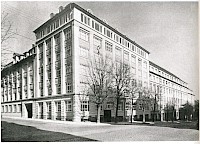
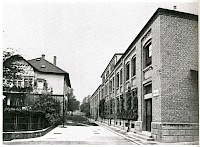
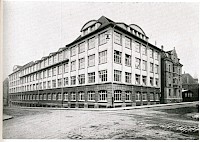
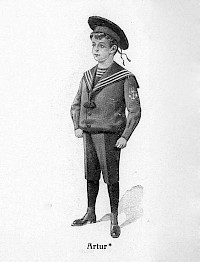
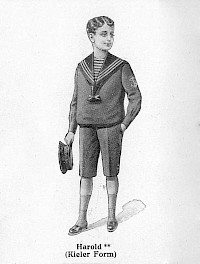
1905 was the company's sales already one million gold marks, in 1913 there were five million RM. The number of employees had increased rapidly. As in other establishments Bleyle tried to integrate all workers despite increasing workforce numbers. The contractor gave all employees at Bleyle the feeling to be part of the family and part of something very special. Bleyle workers had at this time a higher reputation over other factory workers. The company fulfilled at that time all the requirements of hygiene and atmosphere.
The canteen for the workers was good and cheap, there were workers pension funds, the stitching halls were on the latest technology and there was a factory outlet for the workers could buy cheap goods. This was also reflected by the status that a Bleyle worker held over other factory workers. 1910 Bleyle had about 1000 employees, 1918 were good in 2000. Already in 1913 included 4933 business addresses Bleyles clientele. The main product was still the sailor suit. This sold very well especially in the years before the first World War. By 1915 there were already 12 different models.
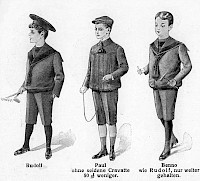
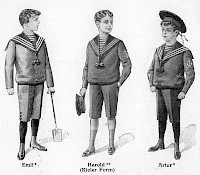
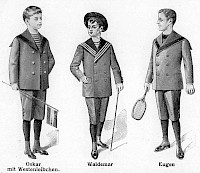
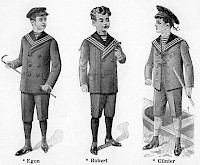
In the time of the first World War, the company was struggling to survive. Like all textile companies had also Bleyle this crisis of shortage of raw materials mainly survive. The war brought no reduction in demand with, but had a noticeable impact on the quality of wool. Bleyles inventories were seized in autumn 1914 for the army. The then allocated wool was mostly of relatively poor quality, so the company sold no clothes under his own brand until the 1920s from 1916, not to damage his reputation.
The First World War brought due to the shortage of raw materials for Bleyle major problems, but the war brought great army orders that could be processed only with a growing workforce. The civilian production came to a interruption, Bleyle saddled fully on military production (as tarpaulins, uniforms and parachutes). When all the raw materials were completely exhausted, was switched to armaments. Subsequent were produced for mines. During this time Max Bleyle managed the operations alone, Fritz Bleyle and Artur Weber had been called at this time for the military.
After the war in 1919, the company was engaged in the construction and conversion to "peacetime production" under difficult economic and political conditions. At this time they were missing many German workers and Bleyle employed during the war years Russian women. During this global economic crisis, the company was under tremendous pressure, the overall economic situation in Germany required courageous decisions. In this time, the children's clothing noticeably lost importance and the demand for women's clothing rose. To 1924-27 patterned and fully fashioned by the new release of the flat knitting machine men, women and children sweater and West could be produced.
From 1930 ladies skirts and dresses for girls and women were increasingly produced; that was the second production section and formed with the first main part of the production to about 1950.
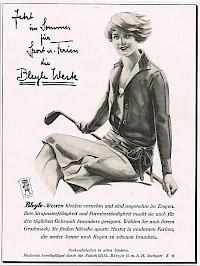
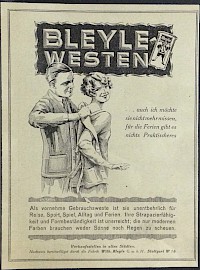
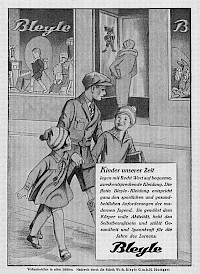
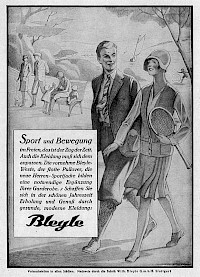
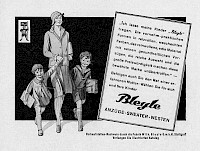
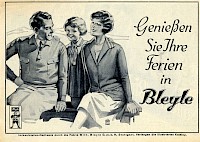
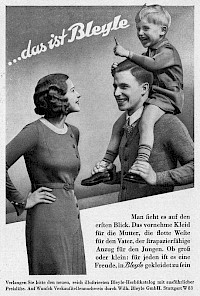
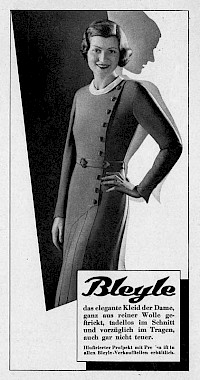
In 1936 with the second four-year plan, the autarky attempts and the conversion of the economy to war products, Bleyle must break new ground to survive. Foreign currency should be got for the NS economy in the country, Bleyle is prescribed an excessive export orientation. Nevertheless, for Bleyle this was a losing deal (the list prices were lower abroad than in Germany; also more expensive advertisement, special costs etc. ). However, a brewery area is bought more in 1936 in Ludwigsburg, Bleyle occupies approximately 6000 workers and employees.
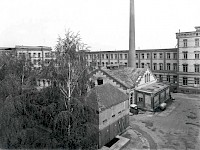
Against the CEO and members of the owning family criminal proceedings for people betrayal, breach of exchange control and tax was introduced. The owners Max Belyle and Artur Weber were detained, criminal and tax payments in enormous amount became due. Fritz Bleyle was spared from the punishment due to his insanity. He was admitted at that time in a mental sanatorium.
1939 Bleyle companies will be given from family hands. The Wilhelm Bleyle GmbH, in which the three partners were involved, each with 800,000 RM had sold through purchase-lease on 12/12/1938 circulating capital, subject to repurchase right to the Wilhelm Bleyle KG and leased fixed assets of the same company. The textile factory Wilhelm Bleyle GmbH assume the standing already in positions of responsibility Bleyle employees, the teacher Adolf husband and the lawyer Dr. Erich Hummel. Both appear as new CEO.
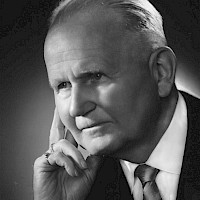
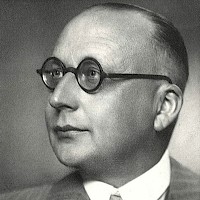
1940 was the newly named company Wilhelm Bleyle K.G. with the new managers as a subcontractor for the company Mahle active. The takeover of the filter production you helped to the so urgent classification as "important for the war operation". The company was founded in the filter Mann + Hummel GmbH for this purpose. Since Adolf Mann and Dr. Erich Hummel were not technicians, they trusted the technical direction of the filter plant at a former knitting masters of Bleyle.
The filters were produced in one of two Bleyle factorys in Ludwigsburg Hindenburgstrasse. Thus, it was from the original factory Bleyle 2 the Mann + Hummel Factory 1 by all oil, air and other fuel filters were prepared from the 1941. The Bleyle textile production focused during this time in the largest factory in the Wilhelm-Murr-Straße in Ludwigsburg.